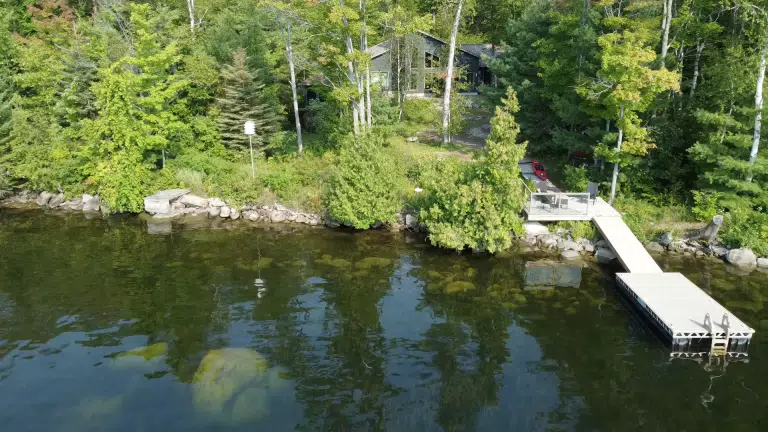A pilot project aimed at improving freshwater quality on Stoco Lake and Dog Lake is proving successful so far.
The “Sustaining Our Freshwater” project is a two-year pilot led by Watersheds Canada along with Quinte Conservation, Cataraqui Conservation, Dog & Cranberry Lakes Association, the Municipality of South Frontenac, the Municipality of Tweed, and Friends of Stoco Lake.
Chloe Lajoie of Watersheds Canada says the pilot is a combination of three of their long-running programs – Planning for our Shorelands, Love Your Lake and The Natural Edge.
Its goal is to educate municipalities and waterfront property owners on the importance of shoreline restoration and to provide the tools, resources and guidance they need to make positive changes in the watersheds around both lakes.
The pilot began last year and is scheduled to wrap up in March 2024.
Lajoie says shoreline restoration is about more than just looking pretty.
“Having a vegetative buffer of native trees, shrubs and wildflowers helps to filter out excess nutrients and pollutants that might wash into the lake in a heavy rainstorm, which are becoming more common, or in the spring, flash or snowmelt, a lot of those nutrients or toxins will run into the lake.”
She adds that that’s one of the reasons why algae blooms are becoming more common because those plants aren’t there to slow the water down and filter out excess nutrients.
Trees, plants and their roots also secure a shoreline by holding the soil together and reducing erosion and and mitigating flooding.
Lajoie says they recommend a combination of trees, shrubs and wildflowers to have different types of root systems.
Trees and shrubs also help wildlife on land and in water.
“For a lot of our aquatic species, like young fish or frogs or turtles, they need that shaded refuge area to protect from the sun and to protect from predators. So all of that overhanging brush is really important to them.”
Through the Planning for our Shorelands initiative, they are educating municipal decision makers and waterfront property owners and developing a tool kit and resources that can be shared with landowners to take steps on their own.
Those resources include a guide to preparing a shoreline naturalization planting plan.
In addition, Lajoie says, through the Love Your Lakes program, they assessed every shoreline property on both Stoco and Dog Lakes.
” … what per cent is natural, what per cent is developed. Any key features that we’re looking for. And we take all that information and each landowner is provided with their own custom property report. And this gives them an idea of how healthy their shoreline is as well as makes recommendations for what they can do to improve it.”
Dog Lake’s almost 430 properties were assessed last year and assessments were completed on just over 250 sites on Stoco Lake this year.
The Natural Edge shoreline guides waterfront landowners with personalized plans on how to naturalize their shorelines.
“We carry out site assessments and then make custom restoration plans that recommend native trees, shrubs and wildflowers that are best suited for their property. And then we help the landowners with the ordering of these plants so that they can take it from there and plant their shoreline and naturalize.”
Representatives have also attended various community events as part of the education component of the pilot program.
This weekend, Saturday, September 16, Quinte Conservation will be available to answer questions about the pilot at the Community Activity Fair at Memorial Park in Tweed (11 a.m. to 3 p.m.).
Lajoie adds that there is an example of a natural shoreline restoration project at Memorial Park thanks to a previous volunteer demonstration planting session.
The “Sustaining Our Freshwater” pilot is scheduled to end in March 2024 but its three programs will continue to run separately.
However, she says it’s been great to see the three programs running simultaneously in these areas providing education to municipalities and landowners, assessing a lake as a whole and then offering solutions to individual property owners.
Watersheds Canada, based in Perth, is a non-profit and Canadian charity committed to protecting Canada’s freshwater.
It is funded by government grants, private foundations and donations.
Funding for this pilot project came from Environment and Climate Change Canada.
Learn more about Watersheds Canada here.






